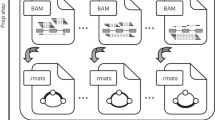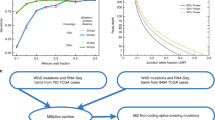Abstract
Several databases have been published to predict alternative splicing of mRNAs by analysing the exon linkage relationship by alignment of expressed sequence tags (ESTs) to the genome sequence; however, little effort has been made to investigate the relationship between cancers and alternative splicing. We developed a program, Alternative Splicing Assembler (ASA), to look for splicing variants of human gene transcripts by genome-wide ESTs alignment. Using ASA, we constructed the biosino alternative splicing database (BASD), which predicted splicing variants for reference sequences from the reference sequence database (RefSeq) and presented them in both graph and text formats. EST clusters that differ from the reference sequences in at least one splicing site were counted as splicing variants. Of 4322 genes screened, 3490 (81%) were observed with at least one alternative splicing variants. To discover the variants associated with cancers, tissue sources of EST sequences were extracted from the UniLib database and ESTs from the same tissue type were counted. These were regarded as the indicators for gene expression level. Using Fisher's exact test, alternative splicing variants, of which EST counts were significantly different between cancer tissues and their counterpart normal tissues, were identified. It was predicted that 2149 variants, or 383 variants after Bonferroni correction, of 26 812 variants were likely tumor-associated. By reverse transcription–PCR, 11 of 13 novel alternative splicing variants and eight of nine variants' tissue specificity were confirmed in hepatocelluar carcinoma and in lung cancer. The possible involvement of alternative splicing in cancer is discussed.
This is a preview of subscription content, access via your institution
Access options
Subscribe to this journal
Receive 50 print issues and online access
$259.00 per year
only $5.18 per issue
Buy this article
- Purchase on Springer Link
- Instant access to full article PDF
Prices may be subject to local taxes which are calculated during checkout




Similar content being viewed by others
Accession codes
Accessions
GenBank/EMBL/DDBJ
References
Ars E, Serra E, de la Luna S, Estivill X and Lazaro C . (2000). Nucleic Acids Res., 28, 1307–1312.
Baranova AV, Lobashev AV, Ivanov DV, Krukovskaya LL, Yankovsky NK and Kozlov AP . (2001). FEBS Lett., 508, 143–148.
Black DL . (2000). Cell, 103, 367–370.
Brett D, Hanke J, Lehmann G, Haase S, Delbruck S, Krueger S, Reich J and Bork P . (2000). FEBS Lett., 74, 83–86.
Claverie JM . (2001). Science, 291, 1255–1257.
Coward E, Haas SA and Vingron M . (2002). Trends Genet., 18, 53–55.
Dralyuk I, Brudno M, Gelfand MS, Zorn M and Dubchak I . (2000). Nucleic Acids Res., 28, 296–297.
Goodison S, Urquidi V and Tarin D . (1999). Mol. Pathol., 52, 189–196.
He J, Smith ER and Xu XX . (2001). J. Biol. Chem., 276, 26814–26818.
Hogenesch JB, Ching KA, Batalov S, Su AI, Walker JR, Zhou Y, Kay SA, Schultz PG and Cooke MP . (2001). Cell, 106, 413–415.
Huang R, Xing Z, Luan Z, Wu T, Wu X and Hu G . (2003). Cancer Res., 63, 3775–3782.
Huang YH, Chen YT, Lai JJ, Yang ST and Yang UC . (2002). Nucleic Acids Res., 30, 186–190.
Ji H, Zhou Q, Wen F, Xia H, Lu X and Li Y . (2001). Nucleic Acids Res., 29, 260–263.
Kan Z, Rouchka EC, Gish WR and States DJ . (2001). Genome Res., 11, 889–900.
Kan Z, States D and Gish W . (2002). Genome Res., 12, 1837–1845.
Kaufmann D, Leistner W, Kruse P, Kenner O, Hoffmeyer S, Hein C, Vogel W, Messiaen L and Bartelt B . (2002). Cancer Res., 62, 1503–1509.
Kawamoto S, Yoshii J, Mizuno K, Ito K, Miyamoto Y, Ohnishi T, Matoba R, Hori N, Matsumoto Y, Okumura T, Nakao Y, Yoshii H, Arimoto J, Ohashi H, Nakanishi H, Ohno I, Hashimoto J, Shimizu K, Maeda K, Kuriyama H, Nishida K, Shimizu-Matsumoto A, Adachi W, Ito R, Kawasaki S and Chae KS . (2000). Genome Res., 10, 1817–1827.
Krawzczak M, Reiss J and Cooper DN . (1992). Hum. Genet., 90, 41–54.
Lander ES, Linton LM, Birren B, Nusbaum C and Zody MC et al. (2001). Nature, 409, 806–921.
Matsui A, Ikeda T, Enomoto K, Nakashima H, Omae K, Watanabe M, Hibi T and Kitajima M . (2000). Cancer Lett., 150, 23–31.
McDoniels-Silvers AL, Nimri CF, Stoner GD, Lubet RA and You M . (2002). Clin. Cancer Res., 8, 1127–1138.
Mironov AA, Fickett JW and Gelfand MS . (1999). Genome Res., 9, 1288–1293.
Modrek B, Resch A, Grasso C and Lee C . (2001). Nucleic Acids Res., 29, 2850–2859.
Nash MA, Deavers MT and Freedman RS . (2002). Clin. Cancer Res., 8, 1754–1760.
Olopade OI, Adeyanju MO, Safa AR, Hagos F, Mick R, Thompson CB and Recant WM . (1997). Cancer J. Sci. Am., 3, 230–237.
Pruitt KD and Maglott DR . (2001). Nucleic Acids Res., 29, 137–140.
Reeve JG, Xiong J, Morgan J and Bleehen NM . (1996). Br. J. Cancer, 73, 1193–1200.
Scheurle D, DeYoung MP, Binninger DM, Page H, Jahanzeb M and Narayanan R . (2000). Cancer Res., 60, 4037–4043.
Schuler GD . (1997). J. Mol. Med., 75, 694–698.
Stamm S, Zhu J, Nakai K, Stoilov P, Stoss O and Zhang MQ . (2000). DNA Cell Biol., 19, 739–756.
Thompson TE, Rogan PK, Risinger JI and Taylor JA . (2002). Cancer Res., 62, 3251–3256.
Valve EM, Nevalainen MT, Nurmi MJ, Laato MK, Martikainen PM and Harkonen PL . (2001). Lab Invest., 81, 815–826.
van der Spuy J, Chapple JP, Clark BJ, Luthert PJ, Sethi CS and Cheetham ME . (2002). Hum. Mol. Genet., 11, 823–831.
Venter JC, Adams MD, Myers EW, Li PW and Mural RJ et al. (2001). Science, 291, 1304–1351.
Wang Z, Lo HS, Yang H, Gere S, Hu Y, Buetow KH and Lee MP . (2003). Cancer Res., 63, 655–657.
Wolfsberg TG and Landsman D . (1997). Nucleic Acids Res., 25, 1626–1632.
Xie H, Zhu WY, Wasserman A, Grebinskiy V, Olson A and Mintz L . (2002). Genomics, 80, 326–330.
Xu L, Hui L, Wang S, Gong J, Jin Y, Wang Y, Ji Y, Wu X, Han Z and Hu G . (2001). Cancer Res., 61, 3176–3181.
Xu Q, Modrek B and Lee C . (2002). Nucleic Acids Res., 30, 3754–3766.
Acknowledgements
This work was supported by Minister for Science and Technology Grant G1998051007 and Chinese High-Tech R&D Program (863)-2001AA231011 and-20022Z2002. We thank Nan Yu and Vu Nguyen for carefully proofreading this manuscript and Prof Naqing Zhao for suggestion on statistics.
Author information
Authors and Affiliations
Corresponding authors
Rights and permissions
About this article
Cite this article
Hui, L., Zhang, X., Wu, X. et al. Identification of alternatively spliced mRNA variants related to cancers by genome-wide ESTs alignment. Oncogene 23, 3013–3023 (2004). https://doi.org/10.1038/sj.onc.1207362
Received:
Revised:
Accepted:
Published:
Issue Date:
DOI: https://doi.org/10.1038/sj.onc.1207362
Keywords
This article is cited by
-
A bioinformatic analysis identifies circadian expression of splicing factors and time-dependent alternative splicing events in the HD-MY-Z cell line
Scientific Reports (2019)
-
Alternative splicing in cancer: implications for biology and therapy
Oncogene (2015)
-
RRP1B is a metastasis modifier that regulates the expression of alternative mRNA isoforms through interactions with SRSF1
Oncogene (2014)
-
Meta-analytical biomarker search of EST expression data reveals three differentially expressed candidates
BMC Genomics (2012)
-
Identification of tumor-associated cassette exons in human cancer through EST-based computational prediction and experimental validation
Molecular Cancer (2010)



